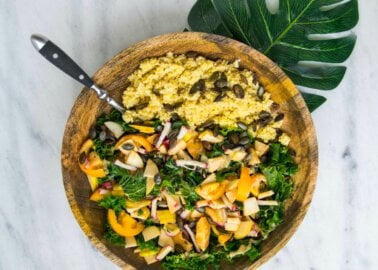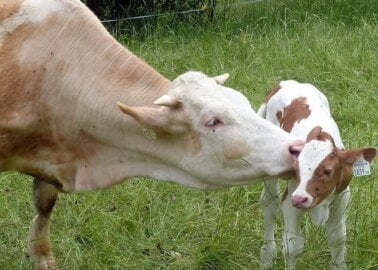Iron, B12, and More: A Guide for Vegans
Eating meat, dairy, and eggs doesn’t just harm animals and the environment – it can also have a negative impact on our health. Eating processed meat increases our chances of developing cancer, and research suggests that consuming animal-derived foods could be as detrimental to our health as smoking.
Eating a balanced mix of vibrant vegan foods, including beans, nuts, whole grains, fruits, and vegetables – along with reliable sources of vitamins B12 and D – is the way to go for a happy, healthy life. Here’s how you can make sure you’re getting everything your body needs:
Calcium
Calcium is plentiful in the plant world. Good sources of the mineral include some dark-green vegetables (such as broccoli, spring greens, and kale), almonds, tahini, tofu, and calcium-fortified vegan milk and orange juice.
The Harvard Nurses’ Health Study found that those who drink two or more glasses of cows’ milk a day are at a higher risk of breaking hips and arms than those who drink one glass or less.
Because dairy can be high in retinol (vitamin A) and saturated fat, consuming animal milks and cheeses can weaken your bones. In addition, people who get their calcium from cows’ milk tend to retain less of it than those who get it from plants.

Vitamin D
Many of us are more likely to be found indoors at a desk than outside in the sunshine – especially in the UK – so vitamin D deficiency is becoming common in vegans and non-vegans alike. Thankfully, it is possible to get enough of this very important vitamin from plants.
Portobello, maitake, morel, button, and shiitake mushrooms are all high in vitamin D. And here’s a tip: you can set them out in the sun to boost their vitamin D content – even 15 or 20 seconds can make a big difference. In addition, non-dairy milks are often fortified with vegan vitamin D, but check the label to make sure.

Iodine
Iodine is a trace mineral that’s important for healthy thyroid function. Table salt is the most common and reliable source, but iodine is usually not found in the salt in processed foods.
You can get iodine from vegan sushi, as seaweed can be a good source. Otherwise, try a multivitamin or kelp tablets.
Vegan sushi donuts?! 😱 These are so creative!
[For more recipes, see @BOSHTV] pic.twitter.com/dJ4OnqhMJV— PETA (@peta) October 17, 2018
Iron
Iron is found in numerous plant foods, including black beans, kidney beans, black-eyed beans, soya beans, chickpeas, tempeh, lentils, oats, many breakfast cereals, wholemeal bread, spinach, cashews, sunflower seeds, vegan burgers, raisins, tomato juice, and black treacle.
Studies have shown that the type of iron in some kinds of animal flesh can raise the risk of developing diabetes, but the iron in plant foods doesn’t. Consuming foods rich in vitamin C – such as citrus fruits and peppers – when you eat iron-rich foods is a good way to increase absorption.

Omega-3 Fatty Acids
There are several vegan sources of omega-3 fatty acids that may contribute to good heart, brain, skin, and joint health. These include flaxseed (also known as linseed), hemp seeds, walnuts – which are also a good source of protein and iron – and chia seeds.
Unlike fish flesh, these foods are free of dangerous levels of mercury and PCBs. Flaxseed can be found at well-stocked supermarkets or health-food stores. Go for ground flaxseed or grind it yourself in a blender or coffee grinder, as some of its nutritional content is inaccessible if it’s eaten whole.
Try sprinkling flaxseed, hemp seeds, or chia seeds on cereal or porridge or adding them to smoothies. You can also pour a teaspoonful or two of flaxseed oil on warm foods, but the oil itself shouldn’t be heated. Store flaxseed and flaxseed oil in the fridge.

B12
Vitamin B12 is responsible for helping our bodies make DNA and red blood cells. It’s essential for optimum health, and a deficiency can lead to serious problems, such as anaemia and damage to the nervous system.
You can get B12 from non-animal sources that have been fortified with it, such as cereals, plant-based milks, non-dairy yogurt, and fortified nutritional yeast – a delicious, flaky superfood that tastes like cheese and can be added to many dishes.
You can also get all the B12 you need from a vegan liquid or pill-based supplement. If you’re concerned that you may not be getting enough, ask your doctor to check by running a blood test.
Protein
Vegans should consume a variety of protein sources, including pulses and foods made with them – such as beans, peas, lentils, peanuts, peanut butter, tofu, tempeh, edamame, soya milk, and vegan meats – as well as nuts, seeds, quinoa, nutritional yeast, and whole grains.
Unlike animal protein, plant-based protein sources usually contain healthy fibre and complex carbohydrates as well. Animal-derived foods are also loaded with artery-clogging cholesterol and saturated fat, and their consumption has been linked to some types of cancer.
On top of that, it’s suspected that the high sulphur content of animal protein weakens people’s bones. For example, a study by researchers at the University of California found significantly less bone formation in meat-eating women than in vegan women.

Why Vegan?
The meat, fishing, egg, and dairy industries are a nightmare for animals, who are treated like a collection of body parts rather than sentient individuals who have the ability to feel pain, fear, and joy.
All animals reared for food suffer. Females are repeatedly forcibly impregnated. Babies are torn away from their mothers, mutilated, and kept in filthy and severely crowded conditions. Then, often when they’re only a few months old, they endure a stressful and terrifying trip to the abattoir, where many are killed while still conscious.
With so many delicious and healthy plant-based options available, going vegan is now easier than ever. Take our 30-day vegan pledge to get more tips from PETA on eating vegan and to show that you’re serious about helping animals. Tell your friends about it, too, and persuade them to follow your example!




